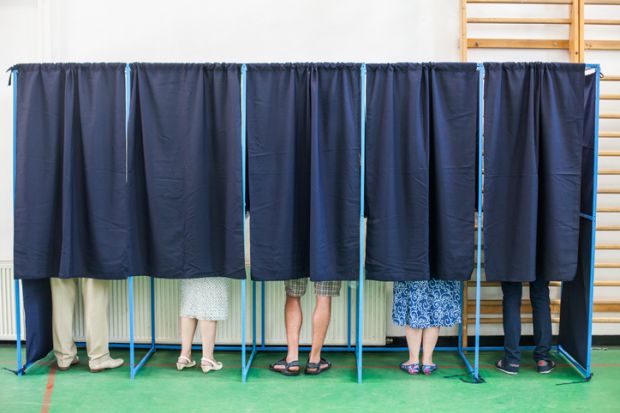Higher education will not feature heavily in the coming Australian election, analysts say, although some believe political parties are overlooking the sector’s untapped potential to deliver votes.
Australian National University policy expert Andrew Norton said he expected higher education to be a “fairly minor issue, as it usually is”. After the Labor opposition rolled out a “very small policy” before Christmas, the differences between the major parties were “barely worth worrying about”.
But Professor Norton said he expected Labor to “try to do more” if it won office, once it had firmer insights into the resources available from a Treasury that had been severely depleted by the pandemic.
Labor is tipped to win the election, which has been set for 21 May. Opinion polls put it between 5 and 14 percentage points ahead of the governing Liberal-National coalition on a two-party preferred basis, although pundits recognise the fallibility of polls.
No major higher education policies have been announced during a de facto election campaign that has already been under way for months. But the Liberal Party has cemented its agenda for the sector, pursuing university and research funding reforms oriented around labour market needs and commercial opportunities.
On the teaching side, the Job-ready Graduates (JRG) package reduced fees for degrees believed to meet industry needs while more than doubling the cost of studying humanities. More recently, the government has instructed the Australian Research Council (ARC) to funnel more money towards applied research and to give industry representatives a say in assessing grant funding applications.
Acting education minister Stuart Robert furthered this agenda in the days before the election was called on 10 April. On 5 April, it was revealed that he had approved a new advisory committee for the ARC, and on 9 April he confirmed career public servant Judi Zielke as the ARC’s substantive chief executive.
Meanwhile, the Labor Party has pledged to fund up to 20,000 extra university places over two years as part of an economic plan focused mainly on training and job creation. But its proposals for higher education are far less ambitious than those preceding the 2019 election, when Labor promised to restore demand-driven funding and to implement a major review of post-secondary education.
Professor Norton said an incoming Labor government might revisit the idea of a review, and would most likely rejig fees. “Humanities graduates are paying a lot, and will potentially be repaying for decades. That’s pretty bad social policy when there is an alternative. It can be fixed without extra cost by changing the student contribution levels by discipline,” he said.
This would involve students in some other disciplines paying more, Professor Norton acknowledged. “It needs to be managed carefully, and it’s probably not something you announce prior to an election.” But Labor had a “history of fixing up things that really are beyond what they can accept”, as demonstrated in its abolition of full-fee domestic undergraduate courses after it ousted the Liberals from government in 2007.
Other sources said higher education was “unfinished business” for people from outer suburban and regional areas, who tended to be under-represented in university enrolments. Boosting participation among such people offered “unrealised potential” for political parties to “pick up some undecided votes” in some of the most marginal electorates.
“It is the conventional wisdom that higher education doesn’t shift votes,” one source said. “I personally don’t think that’s true.”






